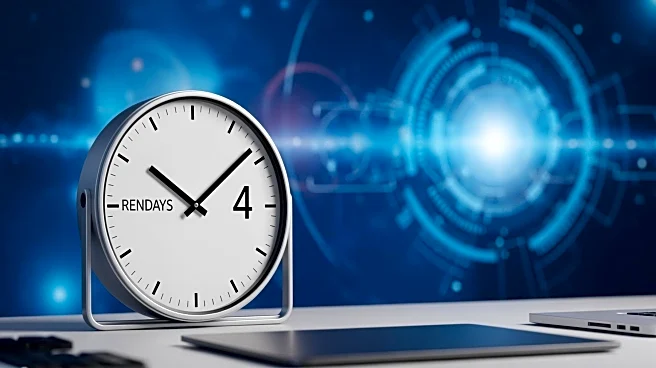What's Happening?
Zoom CEO Eric Yuan announced at the TechCrunch Disrupt 2025 conference that artificial intelligence (AI) is expected to reduce the standard workweek to three or four days within the next five years. This
prediction is based on AI's capability to automate routine tasks through digital twins, allowing employees to focus on more strategic and high-value activities. Yuan demonstrated the practical application of AI by using an AI avatar during a Zoom earnings call, showcasing how these technologies can effectively represent individuals in professional settings. Zoom is investing heavily in AI development, aiming to enhance collaboration tools and streamline workflows. These advancements include interactive whiteboards for real-time idea generation and document sharing platforms that automatically edit content for accuracy.
Why It's Important?
The potential shift to a shorter workweek could have significant implications for various sectors in the U.S. economy. By automating mundane tasks, AI could increase productivity and efficiency, allowing businesses to operate with fewer human resources. This transformation may lead to a reevaluation of work-life balance, potentially reducing employee burnout and increasing job satisfaction. Companies that adopt these AI-driven tools could gain a competitive edge by optimizing their operations and reducing labor costs. However, this shift may also raise concerns about job displacement and the need for workforce reskilling, as AI takes over tasks traditionally performed by humans.
What's Next?
As AI technologies continue to evolve, businesses and policymakers will need to address the potential impacts on employment and the economy. Companies may need to invest in training programs to help employees adapt to new roles that require more strategic thinking and creativity. Additionally, there may be discussions around labor laws and regulations to accommodate the changing nature of work. Stakeholders, including tech leaders and government officials, will likely engage in dialogues to ensure that the benefits of AI are equitably distributed and that potential negative consequences are mitigated.
Beyond the Headlines
The integration of AI into the workplace could lead to broader societal changes, such as shifts in cultural attitudes towards work and leisure. As employees gain more personal time, there may be increased demand for leisure activities and services, potentially boosting industries related to travel, entertainment, and wellness. Furthermore, the ethical implications of AI in decision-making processes will need to be carefully considered, ensuring that these technologies are used responsibly and transparently.









